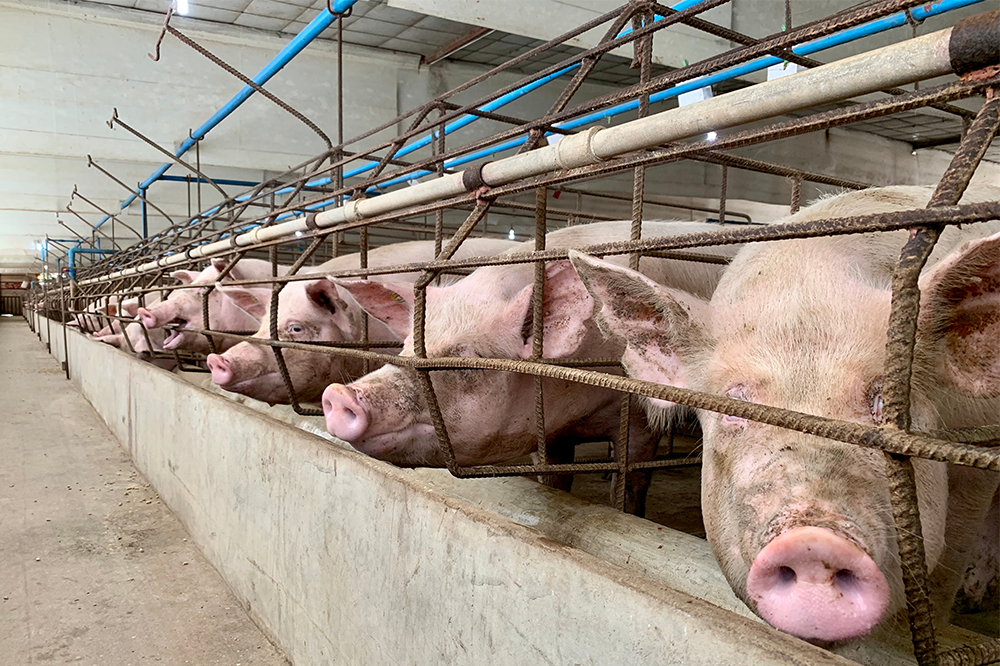Has the need to dramatically reduce GHG emissions from agriculture ‘rationalised’ the intensification of production? By David Burrows
I am writing this over lunch. Sausage casserole, using pork from ‘outdoor bred’ pigs. This means the sows stay outside. The piglets are born in outdoor systems in straw bedded arks with access to a large outdoor paddock, and are brought indoors for growing and finishing at or shortly after weaning. ‘Outdoor reared’ means they spend longer (around half their lives) outdoors (though not necessarily on pasture). There is no legal definition of free-range pork, notes Compassion in World Farming. Organic systems can offer animals “higher welfare”, the group says, and there are also ‘higher welfare’ indoor systems (where they get straw bedding too).
What’s the point of this preamble? Farming Today has been taking a look at intensive farming systems of late, and it’s worth looking out for the on demand episodes because this is going be a hot topic in early 2025. Hospitality businesses need to better understand farming if they want to have any chance of achieving net-zero and this programme isn’t a bad start. Not least because it leaves you in a pickle about which way to turn for the production systems that you can safely say are ‘better’.
Interest in intensification has been piqued thanks to the BBC ‘megafarms’ story a couple of months ago (the number of larger-scale beef and dairy farms in Britain has increased from 756 to 802 in five years, now holding more than 915,000 cattle).
There has also been an application of pressure from campaign groups like WWF-UK, Sustain, Friends of the Earth (FoE) and CIWF. The latter three recently produced a ‘muck map’ detailing where and how much muck is being spread by factory farms. “Intensive agriculture is the main cause of river pollution incidents in England and the biggest cause of animal cruelty on the planet,” noted FoE, as it revealed how 33,450 tonnes of manure is produced every day by chickens and pigs in these factory farms in the UK.
Indeed, if you thought the water companies were at the heart of our river crisis, then think again. But we have to be careful about where the finger-of-blame points. “[…]“we want to make sure it’s the right people getting blamed for this pollution […] the corporates are leaving farmers to deal with it. We can’t give up our farming systems to these [intensive] systems,” said Sustain campaigner Ruth Westcott in an interview with the BBC.
And then came her kicker: “We need to stop rationalising intensive livestock farming systems because they have a lower greenhouse gas emissions profile than more extensive [ones].”
Low carbon beef
I’ve never heard it put this way but this is certainly what appears to be happening – and has been happening for some time. At a conference at SRUC university in Scotland in 2020 I recall representatives of pig farmers saying that they want more accurate GHG data on indoor systems because it will cast these systems in a positive climate light (though the pigs won’t get to see it of course).
It is hard for food companies desperate to reduce their scope 3 emissions and keep ‘consumers happy’ (!) by providing high volumes of cheap meat not to be lured by the prospect of ‘lower carbon’ sausages, steaks and chicken wings. Sainsbury’s has gone all in for this approach to beef. Better breeding as well as “strictly monitored feed and living conditions mean that healthy calves are raised in the most efficient way possible, needing less time and energy to grow, in turn emitting [25%] fewer harmful gases”. In other words, they’re killing the cows quicker: in fact 20% sooner than the industry standard – a fact curiously absent from all the PR (we’ve asked Sainsbury’s how the steaks are selling 12 months on and await a reply).
Farmers involved in such systems appear proud of the difference they are making. The dairy farm at Harper Adams University, which I visited last autumn as part of a farm study tour organised by Prestige Purchasing, is replete with tech and automation so the cows can be monitored closely in their largely housed system. There was a ‘Minority Report’ moment on site when the farm managers explained how they could use the data to anticipate when an animal could get ill.
One intensive poultry farmer interviewed for the recent BBC series who has eight sheds with some 40,000 birds in each said “it makes economic sense to look after animals really well”. However, he warned that with lower stocking densities now popular across supermarket and foodservice supply chains the cost of chicken would inevitably go up. More sheds will need to go up too, he explained, unless more chicken is imported.
Colonel crisis
As we reported in November, KFC has already admitted its targets under the Better Chicken Commitment won’t be met because of access to and the economics of slower-growing breeds. There is also an environmental pressure. Greenhouse gas emissions tend to be lower on intensive farms – a point made by Jude Capper, professor of sustainable beef and sheep production, at Harper Adams to the BBC. “We are not embarrassed about what we are doing,” said the poultry farmer interviewed by the BBC in the viewing area in one of his barns.
But the footprint of those birds goes further than that shed – from local ecosystems to distant ones that provide the soya to feed the chickens. This is Westcott’s point. “Intensive livestock has a much higher emissions profile than other sources of protein,” she explained. “We can’t simply pretend that this type of agriculture is good for the climate and good for the planet.”
Whether it is good for the animals will be debated until the cows come home. What we do know is that in many cases we pretend this is good for farmers at our peril. The fact this BBC series aired in the week thousands of farmers took to the streets of London in protest is telling. Food businesses are fooling themselves if they think this is just about inheritance tax. That news hit at the point where farmers just can’t take anymore, Westcott told me, and yet the agribusinesses behind these intensive systems are making records profits. “There is money in the system but it’s just not reaching farmers,” she said.
Forget rationalising intensive farming, it’s time to get real about how broken this entire system is.









